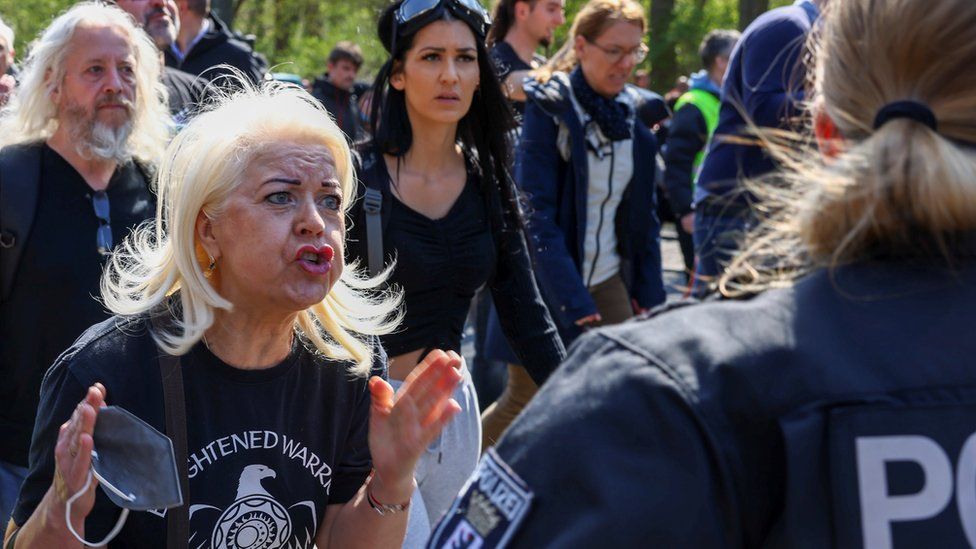Germany Covid: MPs back new lockdown law as protest is broken up
- Published

A controversial lockdown law enabling Angela Merkel's government to enforce an "emergency brake" has been backed by German MPs as police used pepper spray to disperse protesters outside.
Under the amended law, the government in Berlin will be able to impose an overnight curfew and shut schools wherever infection rates rise too high.
Several parties opposed the measures inside the Bundestag.
Eight thousand anti-lockdown protesters demonstrated close to parliament.
Police broke up the demonstration at the Brandenburg Gate, complaining that many of those involved had refused to heed warnings to wear face coverings and observe social distancing rules. More than 150 people were arrested for breaking Covid rules and attacking officers.
Officers said they had fired pepper spray when protesters tried to get through a barrier at the gate and threw bottles. Some 2,200 police were deployed ahead of the vote and the area around the Reichstag building and Brandenburg Gate were cordoned off.
What the law means
Until now Germany's 16 states have each chosen to impose Covid restrictions at their own pace. Any attempt to impose measures from Berlin is seen as a dramatic step.
But the states agreed with Chancellor Merkel earlier this year to an "emergency brake" involving specific measures if the seven-day incidence rate went above 100 cases per 100,000 residents.
Several states then held back even as infections rose across the country. On Wednesday the incidence rate - which measures new infections - was 160.1 per 100,000 and 24,884 infections had been reported in 24 hours.
Some 5,000 people are being treated in intensive care. Only one state, Schleswig-Holstein in the north, has a rate lower than 100.
The head of the RKI public health institute, Lothar Wieler, said after cabinet backed the measures last week that "it is clear, we must act now".
The measures prompted heated debate but still have to go before the upper house or Bundesrat on Thursday before they become law by Saturday at the earliest. They include:
- An overnight curfew from 22:00 to 05:00 when the incidence rate reaches 100 for three days in a row
- A jog or a walk would be allowed until midnight
- Schools should close and switch to online learning when the incidence rate reaches 165 in 100,000 people
- Non-essential shops will be allowed "click-and-collect" operations if the incidence rate is between 100 and 150
- Sport must be limited to members of a household or in pairs if the incidence rate reaches 100
- Children under 14 can still play sport in small groups
The vote was carried by 342 votes to 250, with the left-wing Linke, the liberal Free Democrats and far-right AfD all opposing the measures. Vice-Chancellor Olaf Scholz, whose SPD backed the measures, said clarity and consistency were now necessary across Germany.
The Greens abstained, suggesting that the measures were too little, too late and insufficient to reverse the third Covid wave. Germany is five months away from a general election and one poll this week has put the Greens in the lead, ahead of Mrs Merkel's CDU.
Free Democrat health spokeswoman Christine Aschenberg-Dugnus complained that they restricted people's basic rights and drove them into their homes.
Inside the BioNTech vaccine factory in the German town of Marburg (Video from March 2021)
The AfD's leader in parliament, Alexander Gauland, argued that it was an "attack on civil liberties... as well as common sense" and the government's vaccination policy had failed.
Although the vaccine rollout started slowly in Germany, the country's network of 35,000 family doctors has been enlisted to take part in the campaign and officials expect 20% of the population to be inoculated by the end of April.
Some of those demonstrating outside were far-right activists and conspiracy theorists and most refused to wear masks, BBC Berlin correspondent Damien McGuinness reports. A majority of politicians believe tougher measures are needed, and most voters agree, he adds.
- Published27 September 2021